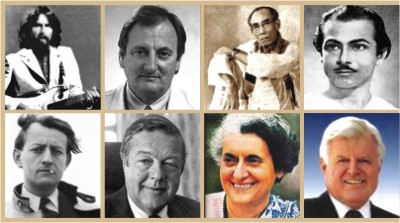Feature
Thanking the 'Friends of Bangladesh'-
Bangladesh Comes of Age
Asrar Chowdhury
“And the story of Bangladesh is an ancient one again made fresh”. Bangladesh by Joan Baez, 'Friend of Bangladesh', 1971.
1971. 266 Days. Three Million lives. 7.83 lives per minute. An estimated Ten Million dislocated in neighboring India. Countless victims of brutalities and crimes against humanity. This is just the human price a nation paid for her freedom. This is just the human price a nation paid to write a ten-letter word B-A-N-G-L-A-D-E-S-H.
As the green fields of East Pakistan became soaked in red that was soon to become Bangladesh, genocide was unleashed on innocent women and men. The entire world reacted. The Liberation War of Bangladesh became a Liberation War of the world's conscience. This was the background to the response against one of the most brutal genocides of the last century.
Slowly and gradually resistance started in Bangladesh. And with this resistance started a response from the conscience of the world. They came from the East. They came from the West. Some used music as their weapon for Jagoron. Others used the ink of their pens. Leaders used their charisma to influence global opinion. Politicians, Litterateurs, Musicians, Journalists and all the common women and men united for a common cause- Stop the Genocide in Bangladesh.
Forty Years on the people of Bangladesh still recall with fond memories and gratitude the contribution of the 'Friends of Bangladesh'. In India we had 'Friends'. Sachin Dev and Mira Dev Burman sang Bangladesh-er Dhol and collected money for the refugees in neighbouring India. Shadhin Bangla Betar Kendra reverberated with lively music from our 'Friends'- Gobinda Halder; Debdulal Banerjee; Angshuman Roy; Gauriprasanna Majumder; Salil Chowdhury; Hemanta Mukherjee and Shyamal Mitra. If the Mukti Bahini was fighting with guns, here were our 'Friends' who fought back with the music of red roses-Ek Sagor Rokter Binomoye; Purba Digonte Shurjo Uthechhe; Mora Ekti Phool-ke Bachabo; Bicharpati Tomar Bichar; Shono Ekti Mujbur-er Theke; Bangla-r Hindu, Bangla-r Bouddha and many others gave hope to the survivors of the Genocide in Bangladesh that there was still hope.
In the West there were 'Friends of Bangladesh'.

Anthony Mascarenhas, Robert Payne and Susan Brownmiller described the Genocide in Bangladesh through their books. Mark Tully, Simon Dring, William Crowley, Martin Woollacott, Loren Jenkins, Don Coggins were among the journalists who fought with their pens to let the world know about the Genocide in Bangladesh. If that was not enough, Poets and Musicians congregated too. American Poet Allen Ginsberg visited the refugee camps and wrote 'September on Jessore Road'. Joan Baez wrote 'Bangladesh' and collected money through charity concerts. Two children of Bangladesh, Ravi Shankar and Ali Akbar Khan teamed up with George Harrison and Friends for the Concert for Bangladesh in Madison Square Garden, New York.
Did we not have friends in Pakistan? Of course we did. Good Men who are good at heart exist everywhere. Who can forget our 'Friend' Poet Ahmed Selim? And another 'Friend' Faiz Ahmed Faiz and his 'Hum Ke Thehere Ajnaabi'. What about our 'Friend' Azghar Khan? These 'Friends' endured prison, but still they had to speak out against the Genocide in Bangladesh. Another 'Friend' Tariq Ali we should never forget.
Politicians, Andre Malraux in France; Peter Shore and John Stonehouse in the UK; and Edward Kennedy in the USA were instrumental in shaping their nation's standpoint on the Genocide in Bangladesh. The greatest political support probably came from Indira Gandhi. Had it not been for this 'Friend of Bangladesh' the thousands who took shelter in India would have had nowhere else to go. The greatest 'Friend', however, is the warm-hearted people of India who embraced us as their own. They gave us food and shelter, but above all, gave us hope that we were not alone in our struggle for freedom.
Forty Years on the State of Bangladesh recalls the 'Friends of Bangladesh'. Forty Years on Bangladesh finally comes of age. The State will finally say thanks on Victory Day 2010. Personally, I think, what is happening is happening for the good. The Songs of Freedom and the Spirit of Ekattur will be re-ignited and it will re-vitalize the hearts of the young once again like it did in 1971. As this piece thanks Bangladesh, it is also an earnest call to the young of Bangladesh- Let us Thank the 'Friends of Bangladesh' and then it will be your responsibility to start another journey, to take Bangladesh to her rightful place on the global stage in the 21st Century. A big THANK YOU to all 'Friends of Bangladesh' in 1971.
(The writer is a university academic in Bangladesh)
| 